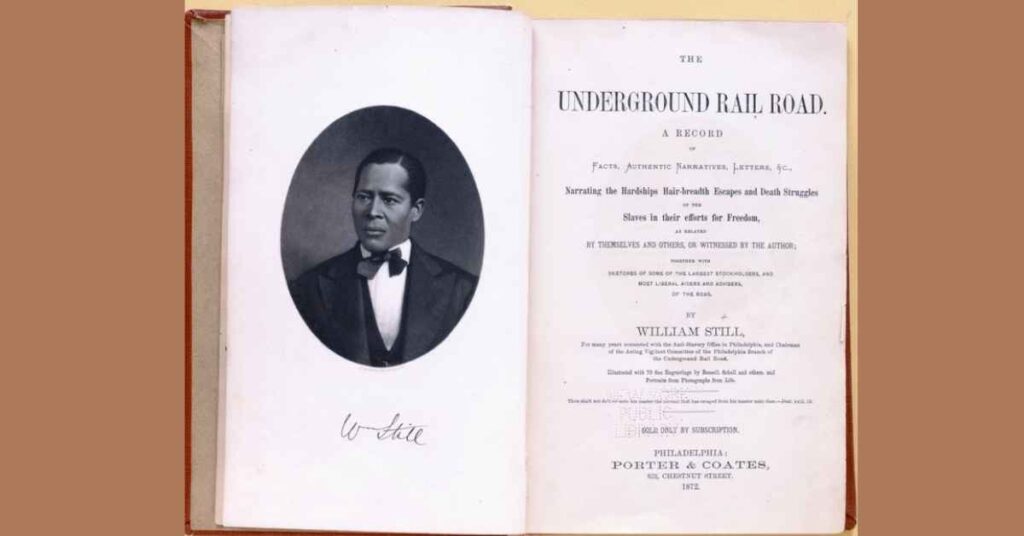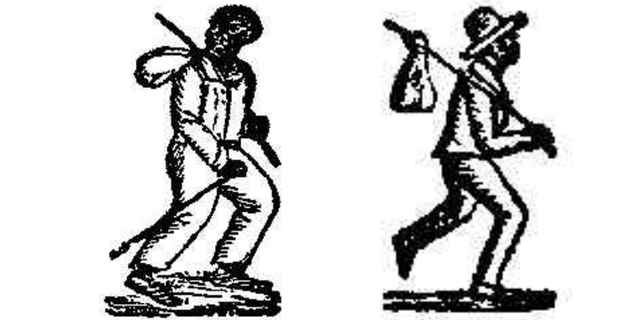This excerpt from “The Underground Railroad” by William Still documents the escape of two brothers on a schooner.
The main challenge for Robert and Joseph Robinson was to raise the funds needed to pay the captain. But Robert worked for a slave trader. He took the opportunity to grab the money from a day’s worth of sales.
The Philadelphia committee who helped fugitives showed no disapproval. One remarked: it is no stealing for one piece of property to go off with another piece.
This excerpt first explains how a schooner captain provided a service to fugitives. We then hear a riveting account of how Robert “Bob” Robinson stole his owner’s money and escaped with his brother.
About The Book
“The Underground Railroad” was published in 1872. The book gives the testimonies of hundreds of slaves who escaped to freedom using the network of agents and safe houses.
The author, William Still, was a black abolitionist and businessman who was a key member of the Philadelphia stop in the freedom network.
The book is in the public domain. It can be found in the Library of Congress.

Excerpt – Account Of A Schooner Captain
[The headings and text in italics were added by the website editor. The rest is verbatim from the book. The “Vigilance Committee” referred to below was a group of Philadelphians who ran the local station on the Underground Railroad. They include the author of the book.]
A fugitive slave law-breaking captain by the name of B., who owned a schooner, and would bring any kind of freight that would pay the most, was the conductor in this instance.
Quite a number of passengers at different times availed themselves of his accommodations and thus succeeded in reaching Canada.
His risk was very great. On this account he claimed, as did certain others, that it was no more than fair to charge for his services—indeed he did not profess to bring persons for nothing, except in rare instances.
In this matter the Committee did not feel disposed to interfere directly in any way, further than to suggest that whatever understanding was agreed upon by the parties themselves should be faithfully adhered to.
Many slaves in cities could raise, “by hook or by crook,” fifty or one hundred dollars to pay for a passage, providing they could find one who was willing to risk aiding them.
Thus, while the Vigilance Committee of Philadelphia especially neither charged nor accepted anything for their services, it was not to be expected that any of the Southern agents could afford to do likewise.

Excerpt – Robert Robinson
Robert…was owned by Robert Slater, Esq., a regular negro trader.
Eight years this slave’s duties had been at the slave prison, and among other daily offices he had to attend to, was to lock up the prison, prepare the slaves for sale, etc.
Robert was a very intelligent young man, and from long and daily experience with the customs and usages of the slave prison, he was as familiar with the business as a Pennsylvania farmer with his barn-yard stock.
His account of things was too harrowing for detail here, except in the briefest manner, and that only with reference to a few particulars.
In order to prepare slaves for the market, it was usual to have them greased and rubbed to make them look bright and shining.
And he went on further to state, that “females as well as males were not uncommonly stripped naked, lashed flat to a bench, and then held by two men, sometimes four, while the brutal trader would strap them with a broad leather strap.”
The strap being preferred to the cow-hide, as it would not break the skin, and damage the sale.
“One hundred lashes would only be a common flogging.” The separation of families was thought nothing of. “Often I have been flogged for refusing to flog others.”
While not yet twenty-three years of age, Robert expressed himself as having become so daily sick of the brutality and suffering he could not help witnessing, that he felt he could not possibly stand it any longer, let the cost be what it might.
In this state of mind he met with Captain B [the captain of the schooner].
Bargaining With The Captain
Only one obstacle stood in his way—material aid.
It occurred to Robert that he had frequent access to the money drawer, and often it contained the proceeds of fresh sales of flesh and blood; and he reasoned that if some of that would help him and his brother to freedom, there could be no harm in helping himself the first opportunity.
The captain was all ready, and provided he could get three passengers at $100 each he would set sail without much other freight.
Of course he was too shrewd to get out papers for Philadelphia. That would betray him at once. Washington or Baltimore, or even Wilmington, Del., were names which stood fair in the eyes of Virginia.
Consequently, being able to pack the fugitives away in a very private hole of his boat, and being only bound for a Southern port, the captain was willing to risk his share of the danger.
Robert Grabs His Owner’s Money
“Very well,” said Robert, “to-day I will please my master so well, that I will catch him at an unguarded moment, and will ask him for a pass to go to a ball to-night (slave-holders love to see their slaves fiddling and dancing of nights).
And as I shall be leaving in a hurry, I will take a grab from the day’s sale, and when Slater hears of me again, I will be in Canada.”
So after having attended to all his disagreeable duties, he made his “grab,” and got a hand full. He did not know, however, how it would hold out.
That evening, instead of participating with the gay dancers, he was just one degree lower down than the regular bottom of Captain B’s. deck, with several hundred dollars in his pocket, after paying the worthy captain one hundred each for himself and his brother, besides making the captain an additional present of nearly one hundred.
Wind and tide were now what they prayed for to speed on the U.G.R.R. schooner, until they might reach the depot at Philadelphia.
Reported In The Local Newspaper

The Richmond Dispatch, an enterprising paper in the interest of slaveholders, which came daily to the Committee, was received in advance of the passengers [in other words, they read about the theft before the fugitives arrived]
When lo and behold, in turning to the interesting column containing the elegant illustrations of “runaway negroes,” it was seen that the unfortunate Slater had “lost $1500 in North Carolina money, and also his dark orange-colored, intelligent, and good-looking turnkey, Bob.”
“Served him right, it is no stealing for one piece of property to go off with another piece,” reasoned a member of the Committee.
“Are You The Ones?”
In a couple of days after the Dispatch brought the news, the three U.G.R.R. passengers were safely landed at the usual place.
And so accurate were the descriptions in the paper, that, on first seeing them, the Committee recognized them instantly.
And, without any previous ceremonies, read to them the advertisement relative to the “$1500 in N.C. money, &c.,” and put the question to them direct: “Are you the ones?”
“We are,” they owned up without hesitation.
The Committee did not see a dollar of their money, but understood they had about $900, after paying the captain.
While Bob considered he made a “very good grab,” he did not admit that the amount advertised was correct.
After a reasonable time for recruiting, having been so long in the hole of the vessel, they took their departure for Canada.
———————————— End Of Except ——————————
Aftermath
William Still’s book records an amusing aftermath to this story. Robert “Bob” Robinson and his brother wrote to their former owners from Canada where they had found work.
They told these owners that they were living a good life with an abundance of food and “very choice wines and brandies.” The brothers issued a cordial invitation to visit.
Now, that’s a burn!
Last Names And Black History
Our website tracks the history of last names of black Americans.
Check out our article on Robinson as an African American surname.